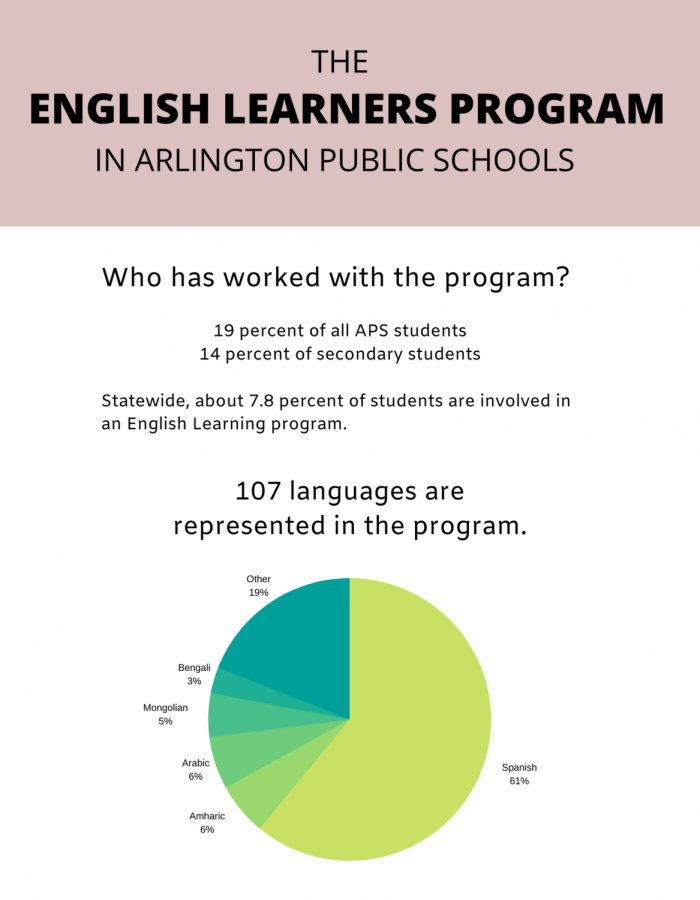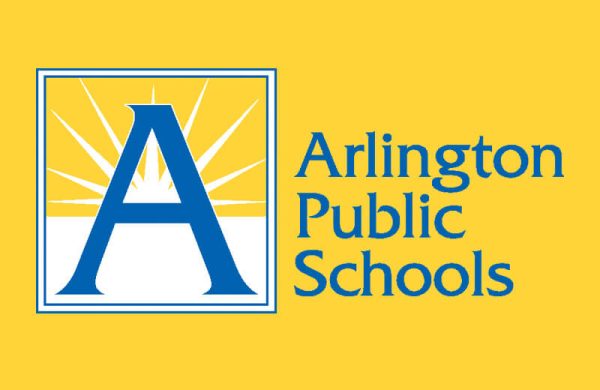One step at a time
County offers special program for learning English
The school’s English Learners (EL) program is part of a larger Arlington Public Schools (APS program to engage students in learning, introduce them to the school community and help them to develop proficiency in English. According to the APS website, 19 percent of students in the county are involved with the EL program. High school EL students are offered English and language arts courses as well as math, science, social studies and elective options.
A student’s work with the English Learner program begins when they first come to APS. Prospective EL students are each evaluated so that county staff can see their English and math skills before being placed in the proper classes.
“Students have to usually test to see what level they’re in,” school counselor Ms. Jessica Benitez said. “They could be from any part of the world. They might not have a lot of English knowledge, so they will test low and start with the first level, which is EL1. As they go through the process, some kids learn in the span of a year. They’ll learn two or three levels so they’ll skip levels. Some of them will learn [at a] slower pace, so they might stay in level one for a little bit longer and show improvement later on.”
A newer program in the English Learners department at the school is the STARS program. STARS debuted last year, and was created to pair up EL students with students already at the school, whether they have a lot of knowledge in another language or a former EL students themselves. The mentors then help their mentees with academics and becoming acclimated to the school.
“They pair them up, they work together, and they come up with a plan and goals that they have for the year, whether it’s academic or personal,” Ms. Benitez said. “It’s like a buddy system, so they’ll support each other and we’ll go on field trips so that they get to know each other. Last year a lot of them made those good connections with each other that they would look for each other and help each other out with different problems.”
The EL department has seen a positive impact from the STARS program even in the short time since it began. Staff who work with the students who are involved in STARS and the EL programs have noted the relationships that have been fostered amongst students in the school
“Our students feel more community,” Ms. Benitez said. “It’s hard coming here and not knowing people, and then being immersed in a school that they don’t know [and] it’s a huge school. Having to learn all these classes that the didn’t have over there in their own countries, and then here everybody speaks a different language, therefore it’s hard for students to connect with someone. By having them be mentees [and] mentors, it helps them have that connection of, ‘okay, I know somebody who’s not within my program that can help me navigate the system.’”
While the EL students who participate in the STARS program have benefitted from having someone to help show them around and work with them, the students who are in the program as mentors have also been impacted in a positive way.
“We had a [mentor who was a] senior last year, and in his goodbye speech, he mentioned how it changed his life,” Ms. Benitez said. “This was a student who was Caucasian, and he expressed how being in the program helped him see the reality because it’s not his reality, but the reality that other students live with and their stories and how it matters.”
Students learning the English language do not only receive assistance from the EL department, but also from the school counselors. As students approach graduation, they have to decide if college is right for them, just like every other student at the school. However, some EL students may face additional challenges as they consider continuing their education.
“Some of them might be documented, some of them might not have documentation, so therefore undocumented students have it a little harder,” Ms. Benitez said. “They can’t get FAFSA, they can’t get [any] financial aid at all. Some scholarships are only geared towards students who are citizens or residents, so they don’t have that support. A lot of them might have DACA, therefore they were protected, but with the new administration, we don’t know where DACA’s going. As of right now, it’s on hold, so therefore those students don’t know if they’re going to be able to attend a school, and if they do, [if] they’re going to have to pay out-of-state tuition because they’re not going to be residents of the state since they’re from another country.”
Programs also exist outside of the school to help students who are newer to the English language as they approach the transition from high school to a career or college. One such organization, Edu-Futuro, visited the school in October so representatives could meet with students. The program offers workshops on subjects like resume building and public speaking, and offers participants the opportunity to apply for one-on-one college application mentoring.
“In my opinion, the most important thing Edu-Futuro does is provide access to populations that would otherwise not have exposure to the services that we provide,” program facilitator Micaela Sanders said. “I also think it is super important to mention that all except one (Saturday Spanish School) of our services are 100% free to beneficiaries.”
Edu-Futuro, and other programs like it, were created in order to help the historically-underserved immigrant populations that were struggling to find support through these processes. Due to the program’s origins, as Edu-Futuro was itself founded by immigrants, its services are designed specifically to be able to help communities that have immigrated to the United States or are still learning the language.
“Many students that join our Emerging Leaders Program are first generation high school or college students, so they might not have their family members to help navigate them through the college application process,” Sanders said. “Some students who get involved through our family programs face difficulties at home, a lack of resources, and structural injustice.”













